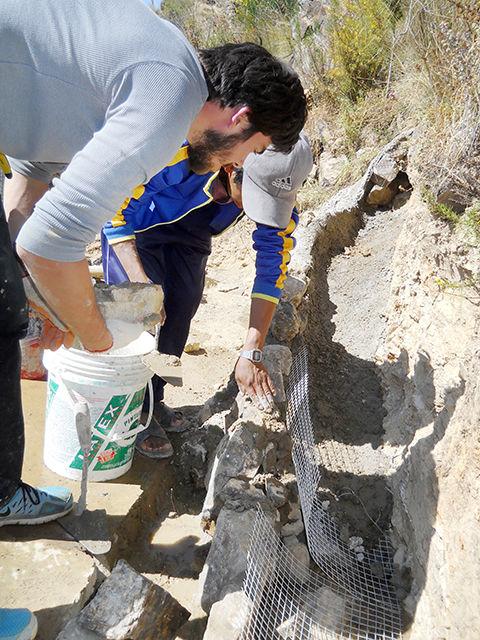 Engineers Without Boarders members worked on a water retention project during the summer of 2015 in Bolivia. " />
Engineers Without Boarders members worked on a water retention project during the summer of 2015 in Bolivia. " />
Contributed by Emily Johnston
Engineers Without Boarders members worked on a water retention project during the summer of 2015 in Bolivia.
NC State’s Engineers Without Borders is working to utilize the knowledge on a top engineering campus to benefit projects internationally. The organization encourages students to work on engineering and infrastructure projects to benefit struggling communities around the world. The local chapter will be hosting the 2015 Southeast Regional Conference Saturday and Sunday.
The conference will include professionals and students from different areas of expertise and will feature workshops and professional development sessions. NC State’s Francis De Los Reyes III, an engineering professor and TED fellow, will be speaking at the conference about his own sanitation work.
Engineers Without Borders is an international organization. Within EWB-USA, there are professional and student chapters that offer networking opportunities. Chapters have one or more international projects. NC State is one of the largest chapters of the Southeast region, according to Emily Johnson, chapter president, head conference coordinator and senior majoring in biomedical engineering.
With two projects currently underway, one in Bolivia and the other in Sierra Leone, each project has its own assigned leader on campus as well as a professional mentor. With each project, the group not only seeks to help the community, but works with the locals to ensure projects are helpful once the group leaves.
“The national organization requires us to submit technical reports every step of the way, so they can follow our progress and ensure our projects are successful,” said Vini Taguchi, vice president of projects and senior studying biological engineering.
The Sierra Leone project is focusing on solar power and water well projects. For the Bolivia project, the chapter has a manual in the works that will explain how to create a water catchment system, allowing the knowledge to create a lasting impact on the surrounding communities.
“Bolivia was our first project, and we’re partnered with a school called ‘SETHA’, an agricultural school on the side of a mountain,” Johnson said. “We’ve put a handful on the roofs, and helped them retain water storage by fixing their septic tank.”
Engineering Without Borders projects are ongoing, with a five-year minimum commitment in order to maintain relationships with the community and for smooth operation. The Sierra Leone projects are almost ready for their next stages of implementation.
The Sierra Leone community has been struggling with infrastructure since its civil war in the early 2000s.
“The country buried the pipeline, so they’ve been stranded without adequate water,” Johnson said. “With the successful wells in the surrounding areas, we figured it would be beneficial to drill them a well.”
The electricity also needs work; the community doesn’t have ongoing refrigeration, so it needs a hub of constant power so it can keep vaccinations and other medical substances safely, according to Johnson. Although the students are eager to learn science, they don’t have the necessary resources. Electricity could also provide night classes for women.
“I started going to school because I was becoming aware of the health disparities in our country and around our globe, and it was unfathomable to me that there are people without vital resources,” said Risa Sayre, webmaster/media specialist and senior studying environmental science. “When I learned there was a student organization dealing with that, I had to join. It’s been a wonderful learning experience.”
Along with their international efforts, Engineers Without Borders works on local projects in the area as well. On campus, they helped to install a rainwater catchment system for the Soul Garden, an organic garden initiative on Centennial Campus. They also plan on working with Exploris Middle School to help lead engineering education projects.
“We’re trying to get an engineering water project together soon for the kids…they get excited about problem solving,” Johnson said.
The chapter is open to anyone who’s interested in international awareness, community involvement, collaborative research and soft-skill improvement.
“It’s a rewarding experience,” Johnson said. “The community makes it feel like a family.”
Although online registration is closed, students are welcome to register at the conference Saturday morning. For more information about the chapter, visit www.ewbncsu.org.